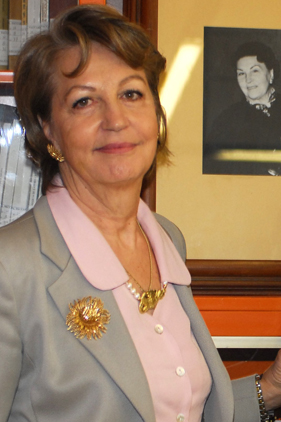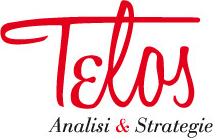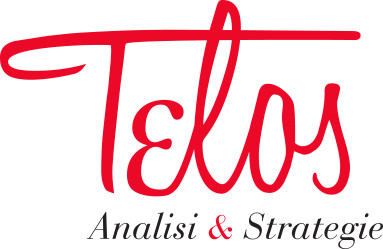December 2016, Year VIII, no. 12
Saveria Dandini de Sylva
For others and with others
“Every day we tackle several battles on various fronts due to the delayed implementation of territorial regulations, but my own personal experience in this field makes me an optimist’.”
Telos: 1936/2016. The Leonarda Vaccari Institute is celebrating the 80th anniversary of its foundation. Would you tell us more about this amazing success story involving your services to people and families?
Saveria Dandini de Sylva: The Marchioness Leonarda Mortillaro de Ciantro Soprano shared a very strong social spirit with her husband, the Crown Attorney Umberto Vaccari. When visiting the families of former detainees she discovered the bitter reality of physical disabilities in addition to their deprived social, economic and cultural surroundings. This situation prompted her to found the Institute. At the time, schools in the Kingdom of Italy were reluctant to accept pupils with disabilities or, in the words of that period, “the crippled, mutilated and paralytic”. In 1934 Dina Vaccari founded Special Schools - Nursery Schools, Primary Schools and Professional Schools - so that children with disabilities could enter the world of work. It was the first example of social integration in Italy. On 15 October 1936 a Royal Decree granted the Institute the status of Charitable Trust and approved its Statute. Its objectives are clearly described in Article 2 and can be summarised with the words “care, education and professional training”. In 1937, thanks to assistance by the Governor of Rome, the Institute moved to Viale Angelico n. 22. During that period it helped 400 disabled children.
The minutes of board meetings held at that time report not only on the importance of adopting a global approach to people with disabilities, but also on innovative ideas about continuing education and health measures tailored to suit each individual. These were all concepts ante litteram of the latest state-of-the-art pedagogical ideas. In 1944 the Institute held its first Specialisation Courses for special educational needs teachers; these courses are still being held today (the Institute is recognised by the Italian Ministry for Education, University and Research). In the fifties and sixties Leonarda attended countless conferences in Europe and the United States; she gave presentations about the integration and inclusion of more fragile individuals and pre-empted the current laws on disabilities by many years.
In the years that followed the Vaccari Institute participated in the European Helios and Horizon programmes. Exchanging ideas with other centres in Europe is proof that a global approach to disabled individuals is really the right way to go. To complete its mission, in 2003 the Institute inaugurated a group home for disabled adults. In 2007 the 2nd Eurispes Report placed the Institute amongst the 100 Top Centres in Italy. More and more collaboration projects and MOUs have been signed with major Italian universities and an increasing number of studies and publications have been published regarding various methodologies of practical caring.
In 2007 the Institute was awarded the Gold Medal of Merit of Public Health Services for having promoted, amongst other things, a new approach to caring for people with disabilities. This approach merges medical issues and social rehabilitation, and involves the whole family. Could you tell us more about it?
Operational methods reflect the way in which the concept of disability has evolved over the years. The shift from custodialism to placement and integration in social environments has led those involved in rehabilitation to develop techniques to enhance inclusion. We need to turn our approach to disability into a global, long-term life plan. Many different professionals are part of the rehabilitation team involved in the global project; these professionals boost the link between the health programme and social and educational programmes and, as far as possible, the placement and reinsertion of the disabled individual in all social life cycles, including schooling.
This approach involves not only disabled individuals, but also their families and social network. The persons’ needs are considered, solutions are found and decisions are taken regarding the structural interventions required throughout their life cycles; these measures also involve the use of technological tools and communication and learning aids. Disabled individuals and their families become a dynamic and interactive part of their own ecosystem. Rehabilitation does not involve repairing the damage and healing the disabled individual - an objective very seldom achieved and only in special cases - but reducing the effects of the disability in the life of those individuals and increasing their ability to use the resources provided by their environment in the most advantageous way possible.
Yours is one of the best institutions in the world of assistance to the disabled. What is your relationship with other centres in Italy? And what is Italy’s standing in this sector?
Numerous centres in Italy focus on the disabled and we are constantly in contact with many of them. We organise seminars, conferences and study days. Collaboration and discussion brings new knowledge and leads to projects, some of which are European. Then there are the council meetings of all the associations involved with the disabled and their families. These councils are part of our public territorial institutions and represent advisory bodies for all the problems associated with disabilities. Italian legislation in this field is excellent: Italy was one of the first countries to talk about inclusion and facilitate work for the disabled. Although our national and regional laws, resolutions and guidelines envisage integrated social and health measures, in actual fact it’s not always possible to implement this integration; public services find it hard to dialogue with each other, more and more regulations are constantly being imposed, responsibility is shared by multiple actors, and people loose sight of the final goal: a caring, inclusive, approach.
So many challenges still have to be tackled and overcome. What do you expect, and what do you wish for the future?
Every day we tackle several battles on various fronts due to the delayed implementation of territorial regulations, but my own personal experience in this field makes me an optimist. Our society is open towards diversity. Take for instance the young generations, the students who spend their school - work programme in the Institute, the volunteers, even our health operators who don’t just perform their professional duties, but pour their hearts into what they do. I would like to see a welfare model more receptive to collaboration between the public and private sector, more efficient and incisive, and more attentive to the needs of people with complex problems. I sincerely hope that services can be integrated so that people with disabilities can be treated in the same way throughout the country and families are relieved of the demanding, burdensome task of having to pursue services from one territorial unit to another in order to be granted an assessment or health visit. Good practices exist in Italy; there are many excellent organisations and new, more coherent and appropriate approaches adopted by multi-professional teams. Our ultimate aim is to ensure that these private ‘best practices’ can interact with the public sector and together create a joint way forward. One which will give families rock-solid assurances and become their point of reference.
Editorial
No mushy feelings, no seasonal emotional moments, no edifying Christmas tales. The fact we’re publishing this remarkable interview with Prof. Saveria Dandini de Sylva in December is merely a happy coincidence. But one we will exploit to the full. It is a beautiful story of dedication, love and commitment towards others, a story that goes back in time. Everything began with a grandmother, albeit with a grand title, but nevertheless a grandmother.
A lady, Leonarda Mortillaro de Ciantro Soprano, decided to leave the cosseted, feather-lined existence she enjoyed thanks to her status and immerse herself completely in a world of marginalisation, suffering and poverty. Without remaining indifferent and without practising sterile charity. With her husband by her side - Umberto Vaccari, President of the Board of the Society for prison assistance and the King’s attorney in Rome - and with his untiring support for her social endeavour, she decided to act, to take responsibility for other people, for the less fortunate, and help them become part of the world.
And so she founded the Institute that bears her name: it is the first example of integration and training for students with physical, mental or sensorial disabilities, but also for people with serious or very serious problems and for their families who cannot find help anywhere else. Prof. Dandini de Sylva exudes optimism and appreciation for Italy. She doesn’t hesitate to praise one of the most advanced legislation for the placement of the disabled. Ours.
In fact, when Italy passed Law 517/1977, the so-called Falcucci law, abolishing differential classes for the disadvantaged it was the first country in the world to abolish segregation of disabled children and integrate them into mainstream schools. In June 2016 the “After us” law was passed granting assistance to individuals with severe disabilities and without family support. The law tries to provide a little more peace of mind to the families of disabled persons, worried about who will protect them when they are gone.
In our work as lobbyists we often face the same problematic issue raised by Dandini: there’s a huge gap between the law, its application and everyday reality. It’s our duty to work with the authorities to close this gap. With this December edition full of joy and commitment, all of us at Telos would like to wish you Happy Holidays and a New Year of peace and serenity.

Saveria Dandini de Sylva is President of the “Leonarda Vaccari” Institute named after its founder, her grandmother. Since 1990 she has been involved in caring for people with physical and mental disabilities. In 1975 she became a Professor of political and economic geography and took part in several school/work projects that took place at the Institute. In 1983 she became a member of the Board and then took over the helm of the Institute after her grandmother died.
She has participated in numerous national and international institutional work groups focusing on care for people with disabilities. In 2011 she inaugurated the auxiliary aids centre in Rome, the first centre for the assessment of computerised communication and learning aids. Assisted by her husband, the lawyer Lucio Ghia, in 2003 she opened the “Casa Maria” group home. In 2006, together with the Opera Don Guanella, she founded the “Mediterranean without disabilities” association and took part in projects on disabilities in Gjibouti.
In 2012 she was awarded the title of Grand Officer of the Order of Merit of the Italian Republic and in 2016 won the Minerva - Annamaria Mammoliti Prize for her social commitment. She teaches numerous regional, national and European professional training courses and is co-author of publications about disabilities and assistive technologies, distributed both in Italy and abroad.
Married with three children, she is always ready to welcome volunteers, students and friends who wish to spent a few hours of their free time with these children, jointly organising day trips, parties, cultural visits and performances: “together one understands that the joy of life is expressed through small gestures of friendship”.
Dandini is curious and loves travelling with her family. She is passionate about good cooking, loves the opera, reads all sorts of books and adores her six grandchildren.







SocialTelos